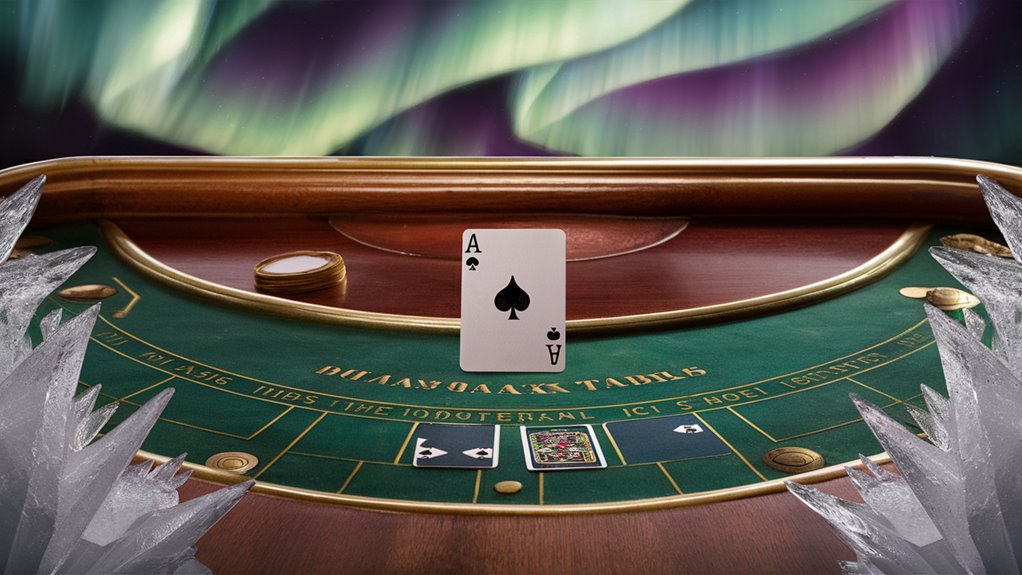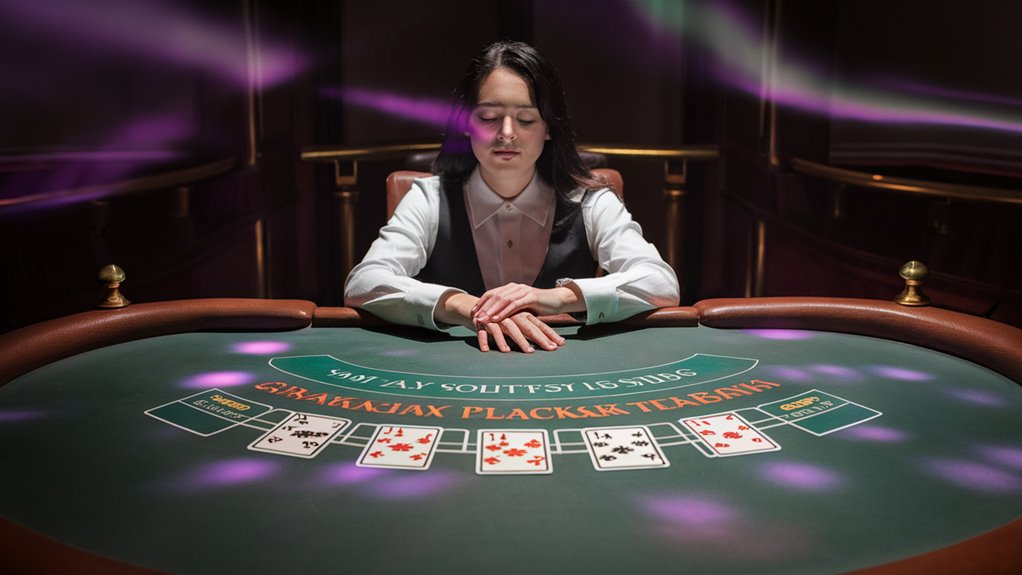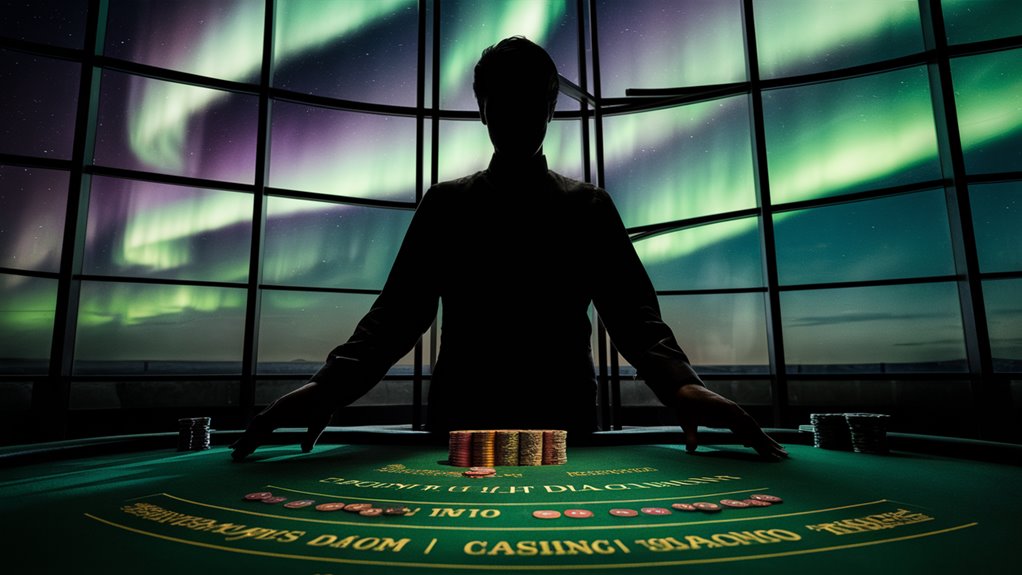
Aurora Affirmations: Mastering Blackjack Mental Performance
Developing an Unshakeable Mindset
Advanced mental conditioning transforms blackjack performance through precise psychological techniques and structured mindset development. The Aurora Affirmation System combines cognitive enhancement protocols with strategic visualization to elevate gameplay decisions.
Core Mental Training Components
- Deep Breathing Integration: Calibrated respiratory patterns optimize mental clarity
- Strategic Visualization: Multi-sensory scenario mapping for enhanced pattern recognition
- Emotional Regulation: Advanced protocols for maintaining peak psychological balance
- Decision Matrix Training: Systematic approach to statistical assessment and choice optimization
Advanced Performance Psychology
Mental conditioning exercises create sustainable improvement through daily practice routines. Players develop enhanced pattern recognition capabilities while maintaining emotional equilibrium under pressure. The system integrates proven psychological techniques with performance-oriented mindfulness practices.
Frequently Asked Questions
Q: How long does it take to see results with Aurora Affirmations?
A: Most practitioners report noticeable improvements in decision-making clarity within 2-3 weeks of consistent practice.
Q: Can visualization techniques really improve blackjack performance?
A: Research indicates that structured visualization enhances pattern recognition and statistical awareness.
Q: What makes Aurora Affirmations different from basic meditation?
A: The system specifically targets gaming-related cognitive functions through specialized mental conditioning protocols.
Q: How often should Aurora Affirmations be practiced?
A: Optimal results come from daily 15-minute sessions, preferably before gameplay.
Q: Are these techniques suitable for all skill levels?
A: The system adapts to both beginners and advanced players, with progressive complexity levels.
Performance Optimization Protocol
Integrate mindfulness techniques with strategic thinking to develop superior decision-making capabilities. Regular practice strengthens mental resilience and enhances statistical awareness during gameplay.
Mindfulness at the Blackjack Table

Mindfulness Techniques for Blackjack Success
Mastering Mental Focus at the Casino Table
Strategic mindfulness is a crucial skill for successful blackjack players, extending far beyond basic strategy and card counting.
Mental preparation and emotional control serve as foundational elements for maintaining consistent performance at the tables.
Pre-Game Mental Preparation
Developing a structured pre-game routine is essential for optimal blackjack performance:
- Deep breathing exercises to center focus
- Setting clear session goals and limits
- Mental visualization of successful gameplay
- Physical comfort assessment and adjustment
Table Awareness Techniques
Maintaining situational awareness during gameplay requires:
- Conscious monitoring of posture and breathing
- Recognition of physical stress signals
- Environmental awareness without distraction
- Emotional state management
Managing Casino Distractions
Key mindfulness disruptors to monitor and control:
- Table conversation and ambient noise
- Alcohol consumption effects
- Win/loss emotional responses
- External pressure from other players
Frequently Asked Questions
Q: How does mindfulness improve blackjack performance?
A: Mindfulness enhances decision-making by reducing emotional interference and maintaining focus on optimal strategy.
Q: What're the best pre-game mindfulness exercises?
A: Deep breathing, meditation, and setting clear intentions are proven pre-game mindfulness techniques.
Q: Can mindfulness help prevent gambling problems?
A: Yes, mindful awareness helps players recognize emotional triggers and maintain responsible gaming habits.
Q: How long should pre-game mindfulness routines take?
A: A focused 5-10 minute preparation routine is typically sufficient for mental preparation.
Q: What physical signs indicate losing mindfulness at the table?
A: Tension in shoulders, rapid breathing, and fidgeting are common indicators of diminishing mindfulness.
Training Your Mental Focus
Training Elite Mental Focus for Peak Performance
Developing Laser-Sharp Concentration
Mental focus training requires systematic development through specific cognitive conditioning exercises and consistent reinforcement.
Break training into manageable segments, starting with 15-minute focused intervals and progressively increasing duration for optimal results.
Core Training Components
Foundational Focus Drills
Basic concentration exercises begin with single-deck counting while tracking time performance.
Progress to advanced drills incorporating background noise resistance and environmental distractions to build mental resilience.
Decision-Making Enhancement
Practice optimal strategy execution under varying conditions through structured scenarios.
Create controlled practice environments with deliberate distractions to strengthen decision-making capabilities under pressure.
Selective Attention Mastery
Master selective information processing by focusing exclusively on critical table data while filtering casino distractions.
Implement specialized meditation techniques focused on strategy visualization and perfect execution.
Performance Tracking and Optimization
Monitor progress through measurable metrics:
- Counting accuracy rates
- Decision-making speed
- Error frequency tracking
- Focus duration measurements
FAQ: Mental Focus Training
Q: How long does it take to develop elite mental focus?
A: Consistent practice typically shows significant improvement within 4-6 weeks of dedicated training.
Q: What're the most effective concentration exercises?
A: Progressive card counting drills, meditation practices, and scenario-based training yield optimal results.
Q: How can I maintain focus in high-pressure situations?
A: Regular practice with controlled stress exposure and proper grounding techniques builds pressure resistance.
Q: What metrics should I track to measure improvement?
A: Monitor counting accuracy, decision speed, focus duration, and error rates consistently.
Q: How often should I practice mental focus exercises?
A: Daily practice sessions of 15-30 minutes produce the most effective results.
Affirmations for Peak Performance

The Power of Performance Affirmations: Rewiring Your Mind for Success
Neural programming through affirmations represents a powerful tool for achieving peak performance in any domain.
These carefully crafted statements serve as mental conditioning devices that strengthen critical neural pathways and reshape behavioral patterns.
Understanding Affirmation Science
When you declare "I maintain unwavering discipline" or "I execute decisions with confidence," you're engaging in active neural restructuring.
These statements create and reinforce positive neural connections, directly influencing decision-making processes and behavioral responses.
Implementing Performance Affirmations
Strategic repetition is crucial for maximum impact.
Select 3-5 core affirmations that align precisely with your performance objectives.
Practice these daily, preferably during moments of peak mental clarity, such as early morning or pre-performance periods.
Key Performance Affirmations:
- "I maintain complete focus under pressure"
- "I make strategic decisions based on facts"
- "I consistently execute my proven system"
- "I remain calm and clear-headed in all situations"
FAQ: Performance Affirmations
Q: How long before affirmations show results?
A: Neural pathway strengthening typically shows measurable effects within 21-30 days of consistent practice.
Q: What makes an affirmation effective?
A: Effective affirmations are present-tense, specific, and emotionally resonant with personal goals.
Q: How many times should I repeat each affirmation?
A: Repeat each affirmation 10-15 times during your daily practice sessions.
Q: When is the best time to practice affirmations?
A: Morning sessions prove most effective, as the mind is most receptive upon waking.
Q: Can affirmations improve actual performance?
A: Research shows consistent affirmation practice enhances focus, decision-making, and performance outcomes.
Building Confidence Through Visualization
Building Confidence Through Visualization in Gaming and Competition
The Power of Mental Rehearsal
Mental visualization serves as a foundational technique for developing unshakeable confidence and peak performance.
Dedicating 10-15 minutes daily to structured visualization practice can dramatically improve decision-making abilities and emotional control under pressure.
Essential Visualization Techniques
Strategic visualization begins with seeing yourself approach competitive situations with absolute certainty.
Focus on maintaining precise movements, calculated decisions, and optimal strategy execution.
Create detailed mental scenarios incorporating:
- Physical precision in movements and actions
- Strategic thinking and real-time adjustments
- Bankroll management and risk assessment
- Emotional equilibrium during both wins and losses
Multi-Sensory Mental Training
Enhance your visualization practice by engaging all senses:
- Tactile awareness: Feel textures and materials
- Auditory focus: Process ambient sounds and interactions
- Visual clarity: Notice detailed environmental elements
- Kinesthetic sensing: Experience physical movements and positions
Performance Enhancement Through Regular Practice
Consistent visualization develops crucial mental attributes:
- Enhanced resilience against emotional interference
- Reduced decision-making errors under pressure
- Improved focus during critical moments
- Strengthened strategic execution
Frequently Asked Questions
Q: How long should each visualization session last?
A: Aim for 10-15 minutes of focused practice daily.
Q: Can visualization really improve performance?
A: Research shows regular visualization enhances decision-making and execution in competitive situations.
Q: Should I visualize both positive and negative scenarios?
A: Yes, practice maintaining composure through various outcomes for complete mental preparation.
Q: When is the best time to practice visualization?
A: Choose a quiet time with minimal distractions, preferably at the same time daily.
Q: How soon can I expect to see results from visualization practice?
A: With consistent practice, improvements in confidence and performance typically emerge within 2-4 weeks.
Emotional Resilience During Gameplay

Building Emotional Resilience in Gaming: A Complete Guide
Understanding Emotional Control During Gameplay
Emotional resilience forms the foundation of peak gaming performance, particularly during intense competitive moments.
Developing mental fortitude enables players to maintain strategic focus regardless of match outcomes or high-pressure situations.
Essential Psychological Techniques
The 3-2-1 Grounding Method
Implement this powerful centering technique during gameplay:
- Identify three distinct physical sensations
- Acknowledge two ambient sounds
- Focus on one specific visual element
Strategic Reset Rituals
Establish clear mental boundaries between gaming sessions through:
- Posture realignment
- Equipment adjustment
- Deep breathing exercises
Maintaining Peak Performance
Cultivate emotional detachment while staying strategically engaged through:
- Independent decision-making regardless of previous outcomes
- Focused breathing techniques during critical moments
- Performance optimization through consistent practice
FAQs About Gaming Emotional Resilience
Q: How can I prevent tilting during competitive play?
A: Practice mindful breathing, implement regular breaks, and maintain physical wellness through proper hydration and posture.
Q: What're effective ways to recover from a losing streak?
A: Utilize reset rituals, focus on process-oriented goals, and maintain consistent strategy regardless of outcomes.
Q: How do I maintain focus during extended gaming sessions?
A: Schedule regular intervals, perform physical stretches, and practice mindfulness techniques between matches.
Q: Can emotional resilience be trained?
A: Yes, through consistent practice, structured routines, and progressive stress management techniques.
Q: What role does physical wellness play in emotional resilience?
A: Proper sleep, regular exercise, and balanced nutrition directly impact emotional stability during gameplay.